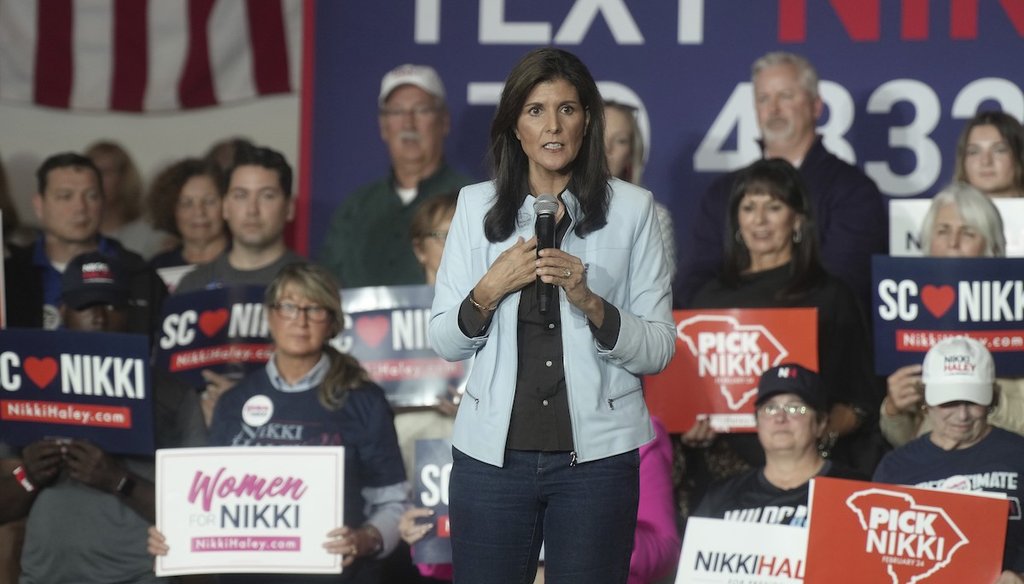

Our only agenda is to publish the truth so you can be an informed participant in democracy.
We need your help.


GOP presidential candidate Nikki Haley speaks on Nov. 27, 2023, in Bluffton, S.C. (AP)
Numerically, Haley is on target with both countries’ ship counts.
Experts say counting ships says little about military capabilities.
Ship counts ignore overall tonnage, specific warfighting capabilities, and overall geographic reach, all of which are metrics where the United States maintains an edge over China.
On the campaign trail, Republican presidential candidate Nikki Haley has warned audiences about a growing military threat from China, arguing that its navy is catching up to the United States’.
"China has built up their military at a scary pace," Haley said in Derry, New Hampshire. China has "the largest naval fleet in the world. They had 370 ships. They'll have 400 ships in two years. We won't even have 350 ships in two decades."
Haley’s numbers, which were similar to ones she cited in the Nov. 8 Republican presidential primary debate in Miami, are about right. Naval ship counts have been a presidential campaign topic since 2012. But do they tell the whole story about naval dominance? Military experts caution that other factors, including ships’ capabilities and advanced technologies, are just as important, if not more so. The nonpartisan Congressional Research Service has called ship counts "a one-dimensional measure."
Haley’s campaign did not respond to an inquiry for this article. The Pentagon’s 2023 China Military Power Report said China’s navy had about 370 warships. The fleet is expected to grow to 395 ships by 2025 and 435 ships by 2030.
The current U.S. fleet is smaller, with more than 280 vessels. The secretary of the Navy expects to reach 300 in the early 2030s.
China is surely gaining ground on the U.S., both in ship counts and overall tonnage — the combined weight of all ships, which helps quantify how many assets a navy has. When Michael O’Hanlon, a senior fellow in foreign policy at the Brookings Institution, compared the two countries’ ship tonnage a decade ago, the U.S. had a roughly 3-1 edge. Now, he said, it’s closer to a 2-1 margin.
Although "tonnage is not a perfect metric," O’Hanlon said, simply counting ships "is a terrible one."
Lance Janda, a Cameron University military historian, said the Chinese navy includes many smaller ships and handles regional duties primarily.
"Ours is a true blue water navy capable of deploying anywhere in the world for an extended period, and we have many more aircraft carriers, far more naval aircraft, more advanced submarines and a larger Marine Corps."
John Pike, director of globalsecurity.org, a think tank, added that "most of the ‘warships’ in the count (for China) are corvettes of a couple of thousand tons," referring to the smallest type of warship. "It’s a class of ship so small the U.S. Navy has never much used them, because they are too small for high-seas operations," Pike said.
Mark Cancian, a senior adviser with the Center for Strategic and International Studies, a think tank focused on national security, agreed that ship numbers "miss a lot."
"The U.S. Navy has global responsibilities, whereas (China’s navy focuses) exclusively on the region," Cancian said.
Haley said China "had the largest naval fleet in the world. They had 370 ships. They'll have 400 ships in two years. We won't even have 350 ships in two decades."
Numerically, she’s on target with both countries’ ship counts. But experts say that simply counting ships omits context about a country’s true military capabilities.
Ship counts ignore overall ship size, specific warfighting capabilities, and overall geographic reach, all of which are metrics where the United States maintains an edge over China.
We rate the statement Half True.
PolitiFact, "Top 5 fact-checks: Republican candidates take aim at Biden’s foreign policy in Miami debate," Nov. 9, 2023
Defense Department, China Military Power Report, 2023
Congressional Research Service, "China Naval Modernization: Implications for U.S. Navy Capabilities—Background and Issues for Congress," Oct. 19, 2023
Email interview with Lance Janda, Cameron University military historian, Nov. 8, 2023
Email interview with Mark Cancian, senior adviser with the Center for Strategic and International Studies, Nov. 30, 2023
Email interview with John Pike, director of globalsecurity.org, Nov. 30, 2023
Email interview with Michael O’Hanlon, a senior fellow in foreign policy at the Brookings Institution, Nov 30, 2023
In a world of wild talk and fake news, help us stand up for the facts.
